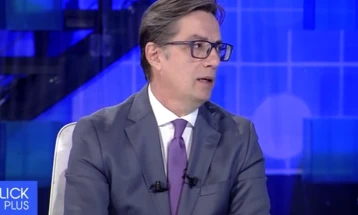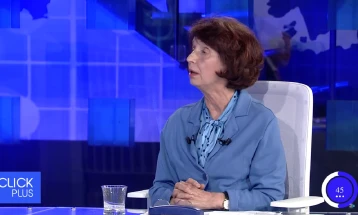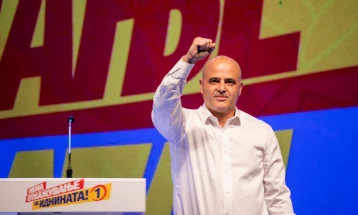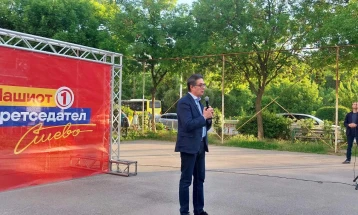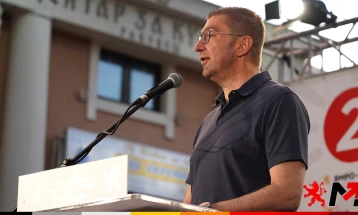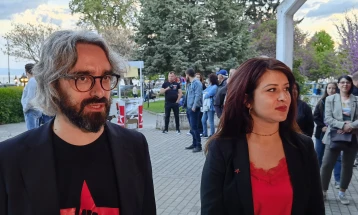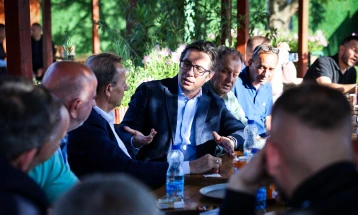What's applicable for European countries, should be also applicable for us too, Siljanovska Davkova tells MIA
- Professor Gordana Siljanovska Davkova, a candidate running for president in the April 24 elections, supported by VMRO-DPMNE and the coalition, believes that a solution can be found for the negotiations framework to resume talks with the EU. In an interview with MIA, she emphasizes she is in favor of the country joining the European Union, adding “we can find an agreement”, for which there are many variants.
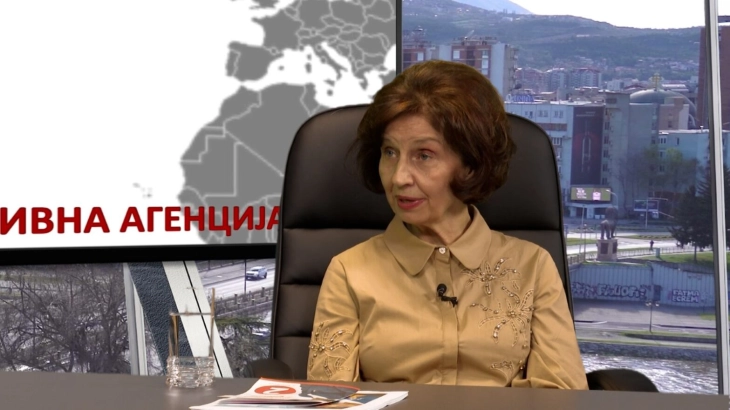
Skopje, 12 April 2024 (MIA) – Professor Gordana Siljanovska Davkova, a candidate running for president in the April 24 elections, supported by VMRO-DPMNE and the coalition, believes that a solution can be found for the negotiations framework to resume talks with the EU. In an interview with MIA, she emphasizes she is in favor of the country joining the European Union, adding “we can find an agreement”, for which there are many variants.
“What I want to say is, of course I’m in favor of the EU, however I don’t perceive the EU fatalistically in order to be afraid to say that if I teach constitutional law, how should I tell the students that the fundamental values and principles safeguarded in court are not applicable for someone in your family who is disobedient, but you too say that they are not applicable for the candidate countries to be respected. This is not right. The EU should be a community of principles instead of bureaucratic machinery. I think we can find an agreement over the enforcement, there are many variants, involving when they will come into force, involving Bulgaria’s responsibility with a threat over article 7 that it must respect the judgements of the Court in Strasbourg. How come you don’t respect court judgements, when you have a judge in the court and it is you who judge others? This is not European behavior. I think a solution can be found, the same way they are saying to Serbia that it’ll change, and it was changed with the methodologies and the negotiations frameworks. However, now they say there is another change regarding the relations with Kosovo,” says Siljanovska Davkova.
Asked whether any changes after the European Parliament elections and the elections in the country might contribute to possibly changing the negotiations framework and the whole process of negotiations for the chapters, Siljanovska Davkova notes that the negotiations framework “isn’t the Bible, the Quran or the Talmud.”
“I keep on listening to them these days. Even the president now has been talking about a new realism. Interesting thing. I know they are practical and pragmatic and they want to solve a problem, but the solving may sometimes be in quotes, leading to a new problem. Even with a different interpretation of the negotiations framework, because it is not the Bible, or the Quran, or the Talmod. If the negotiations framework says it also includes the Friendship Treaty and that agreement includes a preamble noting Bulgaria is obliged to help Macedonia on the path … if a veto is any help, then I have a problem with recognizing the European law,” said the professor.
Could you imagine, stresses the presidential candidate, if Germany and France had used veto back and forth, I’m not sure the founders of the European Community could have made progress, which ultimately had led to enlargement.
Siljanovska Davkova says she has conveyed her position to all diplomats and ministers visiting the Parliament citing the fundamental values and principles of the European Union in their founding documents.

“It is the European constitutional law, protected in the Luxembourg court, the Court of Justice of the European Union and is applicable for all. I’ve been shocked by the response I’ve been getting, saying we’d spoken with the president, the foreign minister about the EU integration, and they say it’s not a problem. And, in fact, there is a problem because these principles include recognition, because the EU’s picture is made up of a unity of diversity and they say they won’t interfere into internal affairs, they will respect the constitutional and political structures, self-determination, dignity and integrity, national and cultural identity, reciprocity in respecting the conclusion of deals, etc. What applies for them, should apply for everyone, and should apply for us, too,” says Siljanovska Davkova.
Commenting on speculation spreading publicly recently that the constitutional changes might be adopted by the current Parliament composition and also on proposals that politicians should be “closed” in a room right after the inauguration of the president and that the constitutional changes might be passed by the end of the year, Siljanovska Davkova says: “It’s awful because it says we do not respect the Constitution or the procedure to amend the Constitution. Do we have a legal state?”
“Does the EU think that by constantly changing the Constitution from the outside we will solve problems … this thing about the good neighborly relations isn’t part of the Copenhagen criteria, it is part of the Stabilization and Association Agreement, because the constitutional democracies are the most important. Do you know what the procedure involves? Three readings for amending the Constitution, followed by a public debate, after which there are deadlines, amendments… I don’t understand a thing. This is how some individuals think what governing should look like – we’ll agree first, then we’ll act as if we have institutions. It means they are making the decisions from the outside. That’s why the institutions are weak, while these individuals are too strong. That’s why we have issues with the European democracy,” says the VMRO-DPMNE presidential candidate.
Professor Siljanovska Davkova believes she will enter the second round of the presidential elections saying that Stevo Pendarovski, backed by SDSM, has the biggest chance to enter the second round considering the opinion polls and the results from the 2019 elections.
“Considering past results and the opinion polls now, one can come to a logical conclusion that Mr Pendarovski again has the biggest chance to qualify for the second round… I think that politics is both practical and pragmatic, where sometimes interesting alliances can be formed. But, I can say one thing – I will act beyond party interests and while seeking coalition partners, I will not allow indecent promises because the situation we’re in is the result of a market-oriented politics instead of politics as the art of the possible,” she tells MIA.
Asked for her opinion about the course of the election campaign, Siljanovska Davkova says it depends on the angle it is viewed from.
“I’ve always said I will fully stick by the program and the goals, but if necessary I will also respond sometimes. I’ve already held many rallies, but there I don’t talk about other people, but when I do I try to be in a decent, not insulting manner. However, there was a problem from the start,” she says recalling that one of the presidential candidates didn’t sign the Code for Fair and Democratic Elections.
Also, she says that people who are “serving as presidents or mayors will use their status for the campaign goals intentionally or unintentionally.”
Regarding the speeches, the professor says some candidates stick to their programs, while others mainly comment.
Siljanovska Davkova tells MIA she is satisfied with the decision of the State Commission for Prevention of Corription (DKSK) about her complaint and she expects the Academy for Judges and Public Prosecutors to file a complaint to the Administrative Court.
“I’ll say this right away that I do not trust the Administrative Court, especially the president of the Administrative Court because in some judgements he has cited articles that do not exits. After meeting with the new members of the anti-corruption commission, I have faith it will continue the work of the previous composition. I have deep respect for the previous anti-corruption commission despite its limited jurisdiction. The former members really fought to protect the Constitution and the laws in the fight against corruption and crime. Also, despite the judgement of the Administrative Court, I will inform OSCE/ODIHR and the donors of the Academy about this,” she says.
Siljanovska Davkova adds that she didn’t file the complaint as a presidential candidate, but as a professor saying that election rules and the law should be respected always, especially during the election process.
“I thought I’d get a response to my complaint, but I heard stories that the Academy was a separate institution. But when I got home, I got worried – the Academy has educational dimension, but I was shocked by the fact that the current composition of judges and public prosecutors includes some hundred people who attended the Academy without meeting the conditions. They passed the bar without graduating,” she says among other things.
Asked about her program and how she plans on attracting more people, especially the undecided, to vote for her, Siljanovska Davkova says the world and Europe have been facing with voter’s abstinence.

“We do not have the right for mandatory voting, like in some countries. I’m against this right. However, this should serve as a wake-up call. I don’t address only those in favor of the party that has nominated me. In the last elections, I won more than 60,000 votes by the undecided. This past four years, my actions were autonomous. I even voted differently than my party. Why? Because I believe it is normal for someone whose life’s philosophy is the rule of law,” says the professor.
In the interview with MIA, Siljanovska Davkova says the people’s offices should be reinstated, noting it’s not a good solution for the president to address Parliament only once by the end of the year; she will use the right to veto in case her warnings about the unconstitutionality of laws are not heard, adding she might also submit initiatives to the Constitutional Court; she will ask diplomats to hold a hearing at the Foreign Affairs Commission before being deployed, etc.
Elizabeta Veljanovska Najdeska
Translated by Bisera Altiparmakova - Marusic
Photo: MIA
Video and editing: Andrej Brankovikj and Vladimir Rabasovikj

